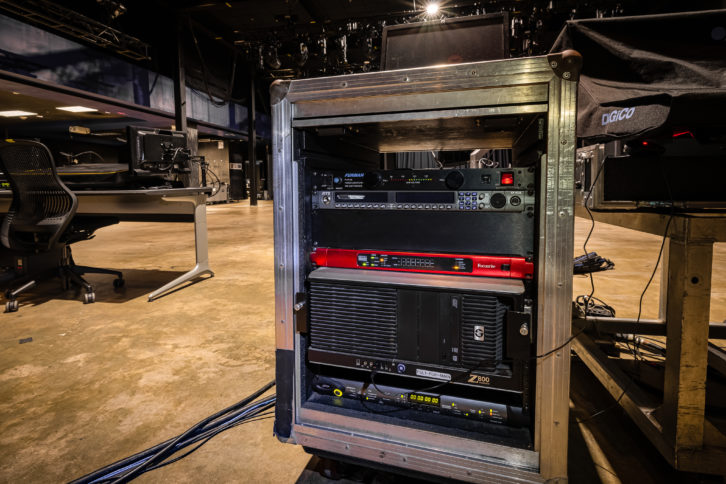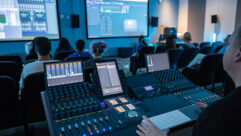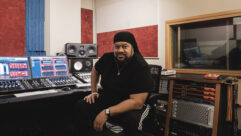
Starting in 2016, Full Sail University, the alma mater of prominent professionals in audio, film, computer animation, emerging technology, and beyond, has deployed Dante network infrastructure throughout the campus – first in its Full Sail Live 1 facility, home to the school’s acclaimed Show Production Bachelor of Science degree program, and then more widely. Since day one, the university’s Dante network has made extensive use of products from Focusrite’s RedNet range of Dante-networked audio converters and interfaces.
Full Sail Live 1 houses a variety of show production-related rooms where students learn about sound reinforcement, lighting, live video and multimedia, and concert touring systems. Focusrite gear installed for the Full Sail Live 1 network included RedNet MP8R eight-channel mic pre and A/D converters, RedNet D64R 64-channel MADI bridges, RedNet HD32R 32-channel HD Dante network bridges and RedNet 2 16-Channel A-D/D-A interfaces. The intent was to create a future-proof network infrastructure for audio and video at the university. “We were looking for a solution to connect the different rooms together over IP, and RedNet was a big part of that solution for us,” Vince Lepore, then the Course Director of the Show Production Systems course at Full Sail University and currently its Director, Event Technical Operations, said in 2016.
In the years since 2016, Full Sail has continued to expand its RedNet network throughout the campus, including to Full Sail Live, the university’s state-of-the-art live performance venue; Full Sail University Orlando Health Fortress, home to Armada, the university’s collegiate level esports team; and to the soundstage facilities dedicated to the Full Sail University’s Dan Patrick School of Sportscasting Bachelor of Science Degree Program. “RedNet is one of the cornerstones in technology that we utilize here,” adds Lepore. The steadily evolving Focusrite system not only provided practical networking throughout the facility, but also offered students practical experience with the Dante audio-over-IP protocol.
When the COVID-19 pandemic descended on the country in early 2020, Full Sail’s implementation of that RedNet network offered the its students and staff a way to navigate the remote learning and other operations it would compel. “We found that when the pandemic hit, we had a lot of capabilities that we hadn’t even tapped into yet in the network that allowed us to continue operating,” says Lepore. “It especially facilitated remote operations, including things like remote intercoms, which we utilize a number of RedNet D64R units for. This was valuable to us for both education and show and event production, because over the year and a half or so of COVID, almost every activity now has some combination of production personnel and talent working remotely. The RedNet infrastructure we installed and have continued to expand served us incredibly well.”
In fact, as over 5,000 students and 2,000+ staff transitioned seamlessly to remote status in less than a single week in March 2020, the university’s teaching never faltered and allowed the university to continue its monthly graduation cycle. Even as the pandemic lingered, Full Sail has added new RedNet units to serve unique purposes, such as the RedNet AM2 stereo audio monitoring units that enable those working on campus to create safely enclosed work spaces within common areas such as control rooms, giving each person networked control over monitoring volume in their space. “We connected the AM2 to powered speakers in each control room space,” explains Lepore. “RedNet is now part of all of our flagship spaces on campus.”
That level of scale is illustrated by how the D64R units are used as the MADI-to-Dante interfaces for the university’s huge audio-for-video infrastructure. “They handle hundreds of channels of audio in and out of our video routers, for example” says Lepore, who says the D64R is “at the heart of what we do in our facilities.”
And that integral embrace of RedNet will continue, even as students began returning to campus last October, because RedNet offers both the solutions for health safety while also creating the same kinds of networked environment that graduates will work in as they launch their careers. “We’ve added RedNet units every year since we started five years ago,” says Lepore, “and it’s something we currently plan to continue to do.”










